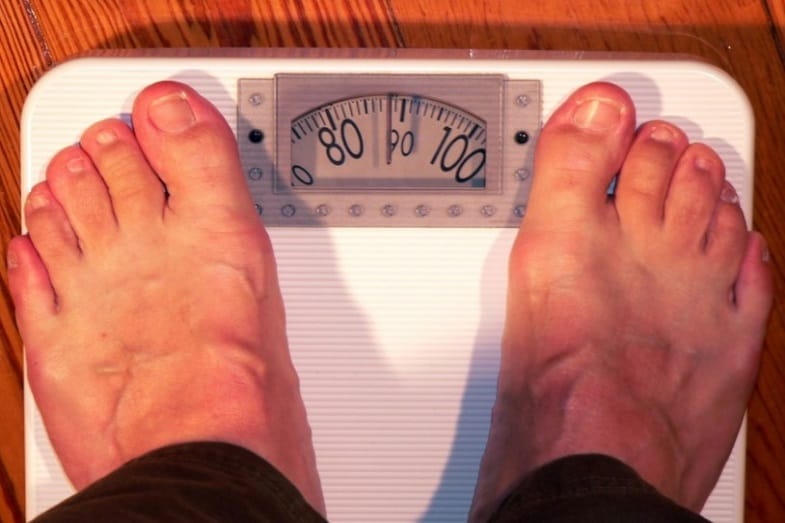How much weight can you gain in a month? If you are wanting to gain or lose weight from lean muscle or fat, it is helpful to know how much weight you can gain in a month. In this article, I will describe how much weight can be gained and how to manage your weight.
How much weight can you gain in one month? You can gain 1 to 2 pounds of weight each month, from muscle or fat, depending on how many calories you consume vs. burn.
The average person, with an average activity level, needs to consume an excess of around 2,000 to 2,500 calories every week to gain one pound of lean muscle weight. To gain a pound of fat, the average individual needs to consume an extra 3,500 calories every week.
When it comes to gaining lean muscle weight, all things being equal, the average male can gain around two pounds of lean muscle weight in one month. The average female can gain up to one pound of lean muscle weight in one month.
Read on to learn more about how much weight you can gain in a month – from muscle or from fat – as well as useful tips for managing your weight.
How Much Weight Can You Gain in a Month?

A research study conducted by Oxford University discovered that dietary fat takes one hour to enter the bloodstream after taking a meal. It will take another two hours for it to be deposited in the adipose tissue located in the body’s midsection.
So if your meal contains 30 grams of fat, you will have several teaspoons of fat on your waist after around three hours. But this weight gain does not last. You will use it as energy, and it will go away as you continue doing your routine activities.
According to Marc Jacobchick, DPT and SPEAR physical therapist, it individually varies when it comes to gaining weight in a month. Weight gain not only varies between males and females but also for each person.
The variables are genetic makeup, rest, diet, hormonal levels, training intensity, volume, and frequency. All of these factors have a specific effect on muscles, and as a consequence, weight gain. Even if an individual maintains a workout routine and follows a perfect diet, he cannot expect to see a considerable weight difference in just a short period of one month.
That being said, according to Jacobchick, the average male can expect to gain around one to two pounds of muscle in one month. However, the average female can expect to gain weight up to one pound in one month.
How to Gain Weight to Build Muscles
You can’t build a gorgeous physique if you don’t have the raw material to do it. So, if you are relatively thin, the primary thing you need to do is gain weight and then build muscles from the weight you’ve gained. How can you do that? Consider the following guidelines below.
1. Eat Foods That Enhance Your Ability to Build Muscles
One of the things you need to consider in gaining muscle weight is your dietary habits. If you see the numbers increase on the weighing scale frequently and you have no problem in liquid retention, the gain is most likely that of fat, not muscle.
Yes, you can gain weight by eating a diet consisting of fatty or saturated foods. But it will not support muscle growth. It may even hamper muscle development. As per Jacobchick, the timing, quantity, and quality of your diet directly impact your ability to build muscle.
What is the best time to eat that will support muscle building? When you are working out, you are straining your muscles. Therefore, after exercise is the best time to refuel your muscles. The recommendation is to eat within 30 minutes to one hour after a workout. It is the best time to eat protein so that you can start the muscle rebuilding process.
The best food you need to eat if you want to build muscles is organic, high-protein food. Your specific condition will determine the right amount of food you will need to eat to build muscle. You can take a reasonable amount of food depending on your current body weight and desired goal weight.

2. Perform Exercises That Are Designed to Build Muscles Faster
All exercises can build physical strength, but not all of them can build muscles fast. What I’m saying is that you can’t just choose any exercise routine if your purpose is to build your muscles. You have to perform exercises that are specifically designed to build muscles fast.
In this regard, it has been proven that resistance exercises, particularly the heavy ones, can build muscles faster compared to exercises using light resistance. The best companion to resistance exercise is cardio exercise, which is the foundation of the principle of overload.
According to the overload principle, the stimulus provided by cardiovascular exercises is not enough to induce considerable muscle gain. Your purpose should be clear before starting to build your muscles.
You are building your muscles not to improve your endurance. Your primary reason for building your muscles is to get them stronger so you can lift heavier weights. To do it, you have to make your muscles bigger.
There must be enough stimuli to cause small tears in your muscles. And if you couple your heavy resistance exercises with the right diet and enough rest, your muscles will regenerate and grow bigger and stronger. The basic idea is that you should use your muscles to build them.
The perfect workout for building muscles is lifting weights. Yes, cardio exercises can be performed, but they will only produce minimal results. Keep in mind that you need to do weight training to build muscle, coupled with minimal cardio.
Doing cardio will help you lose excess body fat. But don’t overdo cardio because it can induce your body to burn muscles. This effect will hinder your purpose of muscle building.
How much muscle weight can you gain in a month? When it comes to gaining lean muscle weight, all things being equal, the average male can gain around two pounds of lean muscle weight in one month. The average female can gain up to one pound of lean muscle weight in one month.
The average man or woman, who is moderately active, needs to consume an excess of around 2,000 to 2,500 calories every week to gain one pound of lean muscle weight.
How to Avoid Gaining Weight from Fat
If you are on the other side of the coin and are carefully watching your weight, there’re certain things that you must follow. It may involve some changes in your eating habits and physical activities. Here are some tips that you can follow.
1. Watch Your Calorie Intake
You should know the number of calories your body needs that can best support your desire not to gain too much weight. It is not because you are building the muscles that you need. The real reason is that you need to control your weight gain.
Basically, if you eat fewer calories than what you actually burn each day, the result will be weight loss. But, if you frequently consume more calories than you can burn each day, the result will be weight gain.
Ergo, if you eat the exact amount of calories you burn each day, you can control your weight and maintain your most desired weight. Remember, one pound of fat is roughly equal to 3,500 calories.
Thus, if you reduce your intake by 500 calories per day and increase your exercise, you can easily lose about one pound of fat a week. One way of reducing your calorie intake is to cut down on your food consumption.
Keep in mind that the total amount of fat (weight) you can gain in one day depends on several factors. They include your metabolism rate, your physical activity level, your current body fat percentage, the food types you are eating, and your glycogen levels, including your genetic makeup.
Many research studies have proven that eating organic and high-protein foods will not result in much weight gain, specifically in the addition of body fat. One study even showed that the participants could burn twice the calories of whole foods than those of the highly processed junk foods.
2. Eat More Protein
Eating a diet high in protein will definitely help in sustaining your ideal body weight. A one-month study revealed that excess intake of protein may not lead to fat gain but may lead to increased lean mass and less weight gain. This study involves overfeeding with 20 percent of calories sourced from protein, compared to only 10 to 14 percent of protein calories.
You also need to understand that there is a limited amount of carbohydrate storage capacity in your body. If you go over the limit, your body will begin to store carbohydrates as fat.
The average person can store approximately 400 grams of carbohydrates in his muscles and about 100 grams in his liver. This data translates to a total of 2,000 calories of carbohydrates. On the other hand, your body has an almost unlimited capacity to store fat.
Your body stores protein differently. And when you consume protein, your body breaks it down and uses it to support your bodily functions. It also increases your muscle mass and uses it for immediate energy. But it can also be stored as fat.
We’ve answered the question, “How much weight can you gain in a month?”; as well as “How much muscle weight can you gain in a month?”; next, let’s look at how you can build your muscles faster.
How You Can Build More Muscle Faster
Now, we have come to the most important section of this article. I’ll show you how to build your muscles faster.
1. Increase Your Calorie Intake
Consuming more calories than you usually burn each day is an effective way of building muscles faster. When your body senses a calorie deficit in the system, it tells your body not to build new muscles.
You need to eat at least 250 to 500 more calories every day. To ensure that these calories go into building muscles and not just fat, they must be sourced from protein-rich foods. A study conducted in 2014 by Pennington Biomedical Research Center proved this.
The study revealed that those who consumed foods rich in protein as part of their high-calorie diet could store 45 percent of those calories as muscle. In contrast, those who consumed a low-protein diet with the same amount of calories stored the said calories as fat.
2. Increase Your Protein Intake
When you exercise, your muscles break down. The most effective way to build them back up is to eat a protein-rich diet. The heavier your lifting exercise is, the more important it is to eat muscle-building foods. A high-protein intake solidifies muscle build-up and recovery.
Weight lifters, based on a University of Stirling research, need to consume 0.25 to 0.30 grams of protein for every kilo of body weight every meal. So, if you are 175 pounds, you need to consume 20 to 24 grams of protein per meal. Three to four eggs, one scoop of protein powder, and a yogurt cup will provide you that amount of protein.
3. Take Creatine Supplements
Creatine does not directly build muscle, but it can boost your performance at high-intensity lifting workouts. Enhancing your strength can promote muscle growth.
If you consume creatine powder in a shake, how much weight can you gain from creatine in a month? If you take creatine powder in a shake, then the same answer applies that I mentioned earlier – it depends on how many calories you consume.
The average male can gain around two pounds of muscle in one month, while the average female can gain up to one pound in one month.
For this to happen, the average person needs to consume an excess of around 2,000 calories every week to gain one pound of lean muscle. To gain a pound of fat, the average individual needs to consume an additional 3,500 calories.
4. Before Sleeping, Snack on Casein
The bloodstream slowly absorbs casein protein. That means this substance can keep your muscles nourished with amino acids for longer periods more than other kinds of protein-like whey and plant proteins.
5. Supplement with HMB
HMB or beta-hydroxy-beta-methylbutyrate prevents the breakdown of muscle proteins. It also speeds up muscle recovery after workouts and encourages muscle growth.
6. Increase Training Volume
To obtain the effective training volume for faster muscle building, perform three to six sets per lift, with each set consisting of 10 to 20 reps.
7. Emphasize the Eccentric Phase
Lifting weights consist of a concentric (hard) phase and an eccentric (easy) phase. Lowering into a squat is eccentric, while going back to standing is concentric. You can increase the eccentric phase by slowing down on every exercise’s eccentric phase or by integrating eccentric-only modifications in your workout routine.
8. Reduce Rest Time Between Each Set
Rest periods should be between 30 and 90 seconds only between sets. This duration will encourage a quick release of hormones required in building muscles, such as the human growth hormone and testosterone.
9. Get Enough Sleep at Night
The body releases human growth hormone when we sleep. Therefore, sleep is an important part of your muscle-building program, not just proper nutrition and workouts. According to one study in the Journal of the American Medical Association, sleeping for 5 hours instead of 8 hours reduces muscle-building testosterone by as much as 10 to 15 percent.
Conclusion – How Much Weight Can You Gain in a Month?
To recap, how much weight is it possible to gain in one month? You can gain approximately 1 to 2 pounds of weight each month, from muscle or fat, depending on how many calories you consume vs. burn.
The average person, with a moderate amount of exercise, needs to eat an excess of around 2,000 to 2,500 calories every week to gain one pound of lean muscle weight. To gain a pound of fat, the average person needs to consume an extra 3,500 calories every week.
When it comes to gaining lean muscle weight, all things being equal, the average male can gain around two pounds of lean muscle weight in one month. The average female can gain up to one pound of lean muscle weight in a month.




